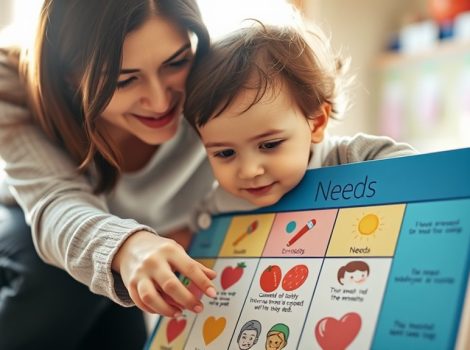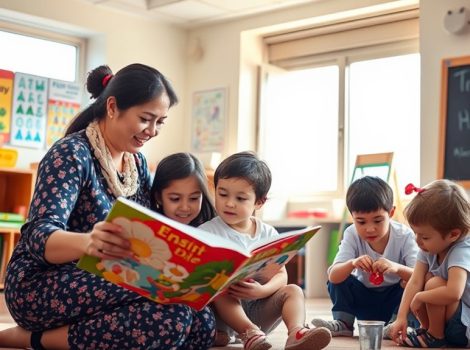Secret to Your Child’s Success- How Parent-Teacher Communication Changes Everything!
The secret to your child’s success lies in effective parent-teacher communication. By maintaining open dialogue, you foster trust and collaboration, creating a supportive environment for your child’s growth. Regular check-ins and constructive feedback help you track progress and address challenges together. When you actively engage with teachers and share insights about your child’s needs, you’re reinforcing their academic goals. Celebrating achievements, no matter how small, motivates them and strengthens your partnership with educators. With consistent communication, you enhance their educational journey, ensuring they’re on the path to success. Discover more ways to optimize this powerful relationship.
Key Takeaways
- Effective communication fosters trust, creating a supportive environment for both academic and social development.
- Regular updates and check-ins keep parents informed of their child’s progress and challenges.
- Collaborative goal-setting aligns efforts, ensuring a focused approach to the child’s educational journey.
- Celebrating achievements together boosts motivation and reinforces a positive home-school partnership.
- Strong communication channels enhance student accountability and contribute to overall educational success.
Importance of Communication
Effective communication is the cornerstone of a successful partnership between parents and teachers. When you engage in open dialogue, it fosters an environment where your child can thrive academically and socially. You’re not just sharing information; you’re building a relationship that prioritizes your child’s best interests.
Effective listening is crucial in this dynamic. It’s not merely about hearing words; it involves understanding the emotions and intentions behind them. When you listen actively, you create a space for mutual respect and trust. This, in turn, allows teachers to provide constructive feedback that’s tailored to your child’s unique needs. Feedback isn’t criticism; it’s a tool for growth. When you receive and give feedback effectively, you can identify specific areas for improvement and celebrate successes.
Moreover, consistent communication helps you stay informed about your child’s progress and challenges, allowing you to support their learning journey more effectively. By prioritizing communication, you empower both yourself and the teacher to work collaboratively, ensuring your child receives the guidance and encouragement they need to succeed. In this partnership, every conversation, no matter how small, contributes to a larger goal: your child’s success.
Strategies for Effective Dialogue
Establishing a consistent routine for communication can significantly enhance dialogue between parents and teachers. Consider setting aside specific times each week for check-ins, whether through emails or phone calls. This creates a predictable structure that fosters active listening. When you engage in conversations, focus on genuinely understanding the teacher’s perspective, and encourage them to share insights about your child’s progress.
Utilizing feedback loops is another powerful strategy. After discussions, summarize what you’ve learned and share your thoughts. This not only shows that you value the teacher’s input but also reinforces the information exchanged. It allows both parties to clarify any misunderstandings, ensuring everyone is on the same page.
Additionally, approach conversations with an open mind. Be receptive to constructive criticism, and ask questions that promote deeper understanding. Your willingness to engage will encourage teachers to share more about their observations and strategies in the classroom.
Building Trust With Teachers
Building trust with your child’s teachers is essential for their success. By keeping open lines of communication and scheduling regular check-ins, you foster a relationship grounded in mutual respect and understanding. This collaborative approach not only benefits your child but also creates a supportive environment for everyone involved.
Open Lines of Communication
Open lines of communication between parents and teachers can significantly enhance a child’s educational journey. When you establish a rapport with your child’s teacher, you create a foundation of trust that encourages transparency and collaboration. Engaging in active listening during conversations helps you fully understand the teacher’s insights and concerns. This exchange allows you to address your child’s needs more effectively.
Moreover, consistent communication fosters feedback loops, where both you and the teacher can share observations and strategies. These loops not only clarify expectations but also provide a platform for discussing your child’s progress and challenges. By actively participating in this dialogue, you empower yourself to advocate for your child’s educational needs.
Encouraging your child to share their school experiences can also serve as a bridge to deeper conversations with the teacher. When you demonstrate that you value the teacher’s perspective, it strengthens the partnership. Ultimately, maintaining open lines of communication creates an environment where your child can thrive academically and socially, knowing they have a support system that includes both you and their teacher. Your proactive approach can make all the difference in your child’s success.
Regular Check-Ins Matter
Regular check-ins with your child’s teacher can play a crucial role in fostering a trusting relationship. These interactions provide an opportunity for meaningful parent involvement, ensuring you’re not just a spectator in your child’s education but an active participant. By engaging consistently, you create feedback loops that enhance communication, allowing you to stay informed about your child’s progress and any areas needing attention.
When you initiate regular check-ins, you demonstrate your commitment to your child’s academic journey. This proactive approach enables the teacher to share insights into your child’s strengths and challenges, fostering collaboration that benefits everyone involved. You’ll gain valuable perspectives on classroom dynamics, helping you to support your child effectively at home.
Moreover, these interactions build rapport between you and the teacher, establishing a foundation of trust. As you cultivate this relationship, you empower the teacher to share critical feedback openly, knowing that you’re genuinely invested in your child’s success. Ultimately, regular check-ins serve as a vital tool for both you and the educator, ensuring that your child receives the support they need to thrive academically and socially.
Mutual Respect and Understanding
A teacher’s perspective on your child’s education can greatly enhance the learning experience when there’s mutual respect and understanding between parents and educators. This relationship plays a crucial role in building trust, which fosters a more productive environment for your child. Engaging in active listening during conversations with teachers is essential; it demonstrates your commitment to your child’s education while allowing you to grasp the nuances of their learning experiences.
When you approach discussions with an open mind, you encourage teachers to share their insights and strategies, which can be invaluable. Providing respectful feedback also contributes to this dynamic. When you voice your thoughts constructively, it shows that you value the teacher’s expertise and are willing to collaborate for your child’s benefit.
Supporting Academic Goals Together
To support your child’s academic goals, it’s crucial to establish open dialogue with their teacher. By setting shared objectives and regularly monitoring progress together, you can create a united front that keeps your child motivated and focused. This collaborative approach not only strengthens communication but also enhances your child’s learning experience.
Establishing Open Dialogue
Open dialogue between parents and teachers is crucial for fostering a supportive environment that enhances children’s academic success. When you engage in meaningful conversations with educators, you create a partnership that focuses on your child’s growth. Active listening plays a vital role in this process. By genuinely hearing what teachers express about your child’s strengths and challenges, you can better understand their academic landscape.
Constructive feedback, both from you and the teacher, shapes this dialogue. When you share insights about your child’s home learning habits, you provide valuable context that can guide the teacher’s approach. Likewise, when teachers offer specific feedback on your child’s progress, it helps you reinforce learning at home. This two-way communication not only keeps everyone informed but also builds trust, ensuring that both parents and teachers are aligned in their efforts.
Establishing open dialogue doesn’t just address immediate concerns; it cultivates a long-term strategy for academic success. By prioritizing these conversations, you empower yourself and your child’s educators to create an environment that nurtures growth, resilience, and a love for learning. Together, you can transform challenges into opportunities, ultimately supporting your child’s educational journey.
Setting Shared Objectives
Setting shared objectives between parents and teachers creates a unified approach to supporting your child’s academic goals. When you engage in collaborative planning, both parties can align their efforts, ensuring that your child’s educational journey is cohesive and targeted. This alignment fosters a sense of accountability and commitment, which is crucial for your child’s success.
By establishing clear and attainable shared goals, you allow for a more focused strategy that addresses your child’s unique needs. It’s essential to engage in regular discussions about specific objectives, whether they pertain to improving math skills or enhancing reading comprehension. This ongoing dialogue ensures that both you and the teacher stay informed about progress and any necessary adjustments.
Moreover, when you work together to set these objectives, you empower your child to take ownership of their learning. They’ll understand that their success is a partnership between home and school. This synergy not only cultivates a supportive environment but also encourages your child to strive for excellence, knowing they have a strong support system behind them. Ultimately, setting shared objectives can make a significant difference in your child’s academic achievements.
Monitoring Progress Together
After establishing shared objectives, the next step is monitoring progress together to ensure those goals are being met effectively. Effective progress tracking is essential for both you and your child’s teacher to gauge how well your child is advancing towards their academic targets. Regular updates on your child’s performance can help identify strengths and areas needing improvement, allowing for timely interventions.
Schedule consistent feedback sessions with the teacher. These meetings serve as an opportunity for you to discuss your child’s progress, ask questions, and share insights about what’s working at home. This two-way communication fosters a collaborative approach to your child’s education, ensuring that both you and the teacher are aligned in your support strategies.
Utilize tools like progress reports or online portals to stay informed about your child’s achievements and challenges. This transparency not only empowers you to engage more deeply in your child’s learning but also reinforces the importance of education in their eyes. By actively participating in this monitoring process, you create a nurturing environment that champions your child’s academic success.
Addressing Concerns Collaboratively
Effective communication between parents and teachers is essential for addressing concerns collaboratively. When you approach a concern with an open mind and a willingness to listen, you set the stage for effective concern resolution. It’s crucial to recognize that both you and the teacher share a common goal: your child’s success.
Start by identifying specific issues that need attention. Whether it’s academic performance or social challenges, articulating your concerns clearly fosters understanding. Schedule a meeting to discuss these matters, ensuring both parties are prepared to share insights and solutions.
During this dialogue, focus on collaborative solutions. Ask questions and listen actively to the teacher’s perspective. This not only validates their expertise but also creates a partnership aimed at finding the best path forward for your child.
Celebrating Achievements and Progress
Celebrating achievements and progress is vital to fostering a positive educational experience for your child. When you actively engage in recognizing their accomplishments, no matter how small, you reinforce their sense of self-worth and motivation. Achievement recognition plays a crucial role in this process; it encourages your child to take pride in their efforts and strive for further success.
As you communicate with teachers, ask about your child’s progress milestones. This dialogue can provide valuable insights into their academic and social development. Understanding these milestones allows you to celebrate specific achievements together, creating a supportive environment that values growth and perseverance.
To maximize the impact of these celebrations, consider establishing routines that acknowledge achievements at home. Whether it’s a simple verbal acknowledgment or a more formal celebration, these actions will reinforce the importance of their progress. Moreover, when you share these moments with teachers, it fosters a collaborative relationship that enhances your child’s learning experience.
Ultimately, celebrating achievements and progress not only boosts your child’s confidence but also strengthens the partnership between home and school, paving the way for a successful educational journey.
Frequently Asked Questions
How Can I Initiate Communication With My Child’s Teacher?
To initiate communication with your child’s teacher, start by crafting a polite email. Use proper email etiquette, ask about classroom updates, and express your interest in supporting your child’s learning. This establishes a positive connection.
What if My Child Has Special Educational Needs?
Navigating your child’s educational journey can feel like a quest for the Holy Grail. Embrace individualized education plans and collaborative strategies; they’ll empower you to advocate effectively, ensuring your child receives the support they need.
How Often Should I Communicate With Teachers?
You should aim for weekly check-ins with teachers and send email updates as needed. Regular communication keeps you informed, helps address any concerns, and fosters a supportive environment for your child’s educational journey.
What Should I Do if I Disagree With a Teacher’s Assessment?
When you find yourself at odds with a teacher’s assessment, approach the conversation like a gardener tending to delicate plants. Share your insights on assessment strategies and seek constructive feedback to cultivate a fruitful discussion.
Can Parent-Teacher Communication Improve My Child’s Behavior in Class?
Yes, consistent parent-teacher communication can enhance your child’s behavior in class. By sharing behavior strategies and insights, you help create a supportive classroom environment, enabling teachers to tailor their approach and effectively address your child’s needs.




